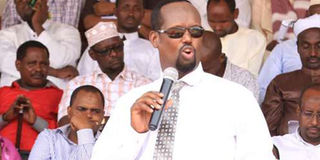N. Eastern leaders pledge to flush out Al-Shabaab

Mandera Governor Ali Roba. Leaders of North Eastern counties have agreed to volunteer any information that could help flush out Al-Shabaab terror group. PHOTO | MANASE OTSIALO | NATION MEDIA GROUP
What you need to know:
Governors, MPs and religious leaders urge residents to give information to police.
Mandera County commissioner Olaka Kutswa says lack of political goodwill has made fight hard.
- Religious leaders, village elders, the youth and women leaders also pledged to co-operate with the authorities.
Leaders of North Eastern counties have agreed to volunteer any information that could help flush out Al-Shabaab terror group.
The leaders said terrorism had led to poor development and they needed to act.
The resolve to flush out the illegal militia using information from the public has been an ongoing process and yesterday was its culmination as Mandera Governor Ali Roba hosted his colleagues during a conference on de-radicalisation and countering violent extremism in the region.
EDUCATION
Those who attended the meeting held in Mandera town include governors Ali Korane (Garissa), Mohamed Kuti (Isiolo), Wajir deputy governor Mohamed Mukhtar, area MPs and County Commissioner Olaka Kutswa.
Mr Kutswa has been critical of the area politicians, saying they are not providing the much-needed goodwill to complement the government’s efforts in the war against terrorism.
“When you kill teachers, you are killing the education sector in the region same as the health sector will be affected when you kill the nurses. If the political voice is weak, there is nothing we can do,” said Mr Olaka.
INFORMATION
Religious leaders, village elders, the youth and women leaders also pledged to co-operate with the authorities to deal with cases of radicalisation.
It was the first time the leaders were meeting over the issue. Before the meeting, none would talk about it but yesterday they were united.
Leaders urged the public to volunteer information to the police or risk being isolated by the whole country because of the terrorist activities.
INFILTRATED
“Their attacks are worse than colonisation. They have made our schools, hospitals, quarries and all other critical sectors of our economy lack human resource because of fear,” said Mr Roba.
He added: “The menace has been compounded further by the inter-clan fighting that has been infiltrated by the terror group. If indeed you care, defend your land by providing the required information to the authorities.”
The region, specifically Mandera, has suffered the most heinous acts of terror attacks with thousands killed since October 2010, when the Kenya Defence Forces crossed to Somalia.
BOMBING
In November 2014, suspected Al-Shabaab terrorists killed at least 64 people in Mandera within just 10 days.
During the same month, 28 others were killed and days later, 36 miners had their lives cut short.
The worst of them was in Garissa when 149 students of Garissa University were killed in 2015, forcing the government to explore lasting measures of containing the terrorists including bombing their cells in Somalia.
INSURGENTS
Mr Korane said Al-Shabaab’s activities are no longer a national problem but a regional one that the residents must deal with.
“We have contributed to this problem because we have young people who have been recruited to join them, but we do not want to share the information with the government agencies,” Mr Korane said and challenged the government to give amnesty to those willing to return from Somalia. “An insurgent is more difficult to deal with than terrorism because you can’t fight it using the police or military but the local community. We want normalcy in our borders,” he said.
RESPONSIBILITY
Mr Kuti said the militia has made the residents slaves.
MPs Adan Haji (Mandera South), Omar Maalim (Mandera East) and Abdullahi Bashir (Mandera North) also castigated the terrorists.
“Let’s not fear, but fight these people because it is your responsibility. The government should only come in to supplement our efforts,” Mr Bashir said.
Mr Maalim said: “We must deal with them.”






